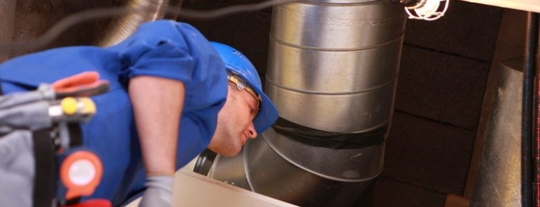No doubt about it: Home repairs and maintenance can be a scary thing. We worry about cost, choosing the right company and contractor, avoiding unnecessary inconvenience and, above all else: is what we are about to do even worth it?
We all know the horror stories of home repairs that went on forever and spiraled out of control. Alternately, on the other end of the spectrum, home maintenance put off for far too long could have catastrophic consequences.
So let’s talk about the necessary and relatively inconvenience-free task of having your heating, ventilation, and air conditioning (HVAC) system (or, more colloquially – your air ducts) cleaned. If you go about it the right way, you will have no regrets, only benefits.
Here are some answers to a few basic questions.
How Often Should I Clean My HVAC?
The simple answer to this is at least once every four or five years. Let’s talk about why that is.
Dust, allergens, dirt and debris accumulate in your ducts. In fact, your ducts could easily buildup several inches or more of these elements. This buildup will trap even more allergens and bacteria – and possibly foster the growth of mold.
Based on lifestyle and the health issues of family members, some people may wish – or even need – to have their ducts cleaned more than the standard once every four or five years. Some factors to consider:
- Are there regular smokers in the household?
- Do you have pets who shed hair a lot?
- Are there family members who suffer from allergies or asthma that indoor pollutants exacerbate?
- Have you recently renovated or remodeled your home?
If you answered yes to any of these, you may want to consider having your air ducts cleaned a bit more often.
What are the Health Benefits from Cleaning My Home’s Air Ducts?
As discussed above, your home’s air ducts collect a variety of contaminants, such as mold, fungi and bacteria. Getting rid of these contaminants from your home’s heating, ventilation and air conditioning system is an essential element for improving your indoor air quality – and your health.
Will Cleaning My HVAC System Reduce My Home Energy Bills?
Though you may not see an immediate drop-off in your home’s monthly energy costs, the long-term financial benefits to regular HVAC system cleaning are very real. Air ducts cleaning helps your home’s HVAC system run more efficiently. A cleaner, more efficient HVAC system is less likely to break down and more likely to have a longer life span. This allows you to get the most out of your system with less headaches, inconvenience and cost.
What are the Steps and How Long Will it Take to Clean My Home’s HVAC System?
The most popular methods for cleaning a home’s heating, ventilation and air conditioning system are vacuuming, rotary brushing and air sweeping. Doing this will most likely involve two professional technicians working for a few hours in your home.
Using special tools and a negative airflow system (basically, a huge vacuum), the technicians scrape the dust, dirt and debris from your ducts. The tools separate the particles from the sides of the ducts where they’ve accumulated and the vacuum prevents them from escaping into your home.
The cleaning should also include your home’s furnace, air conditioner components and, if the technician thinks is necessary, applying mold-inhibiting agents as well. Before any of this takes place, a good HVAC system cleaner will walk you through all the steps so you know and understand how the job will get done.
What Should I Consider When Selecting a HVAC System Cleaning Contractor for My Home?
First off, always start with personal referrals from people whom you trust. Who have friends and neighbors used to their satisfaction? It’s also okay to have a HVAC contractor come to your home, perform an inspection and give you a quote. Here are a few additional factors to consider:
- Is the company or contractor a member in good standing of the National Air Ducts Cleaners association (NADCA)?
- Make sure you choose a company or contractor that has proper licensing and carries adequate insurance.
- Make sure the company or contractor knows and understands your home’s specific heating, ventilation, and air conditioning system.

